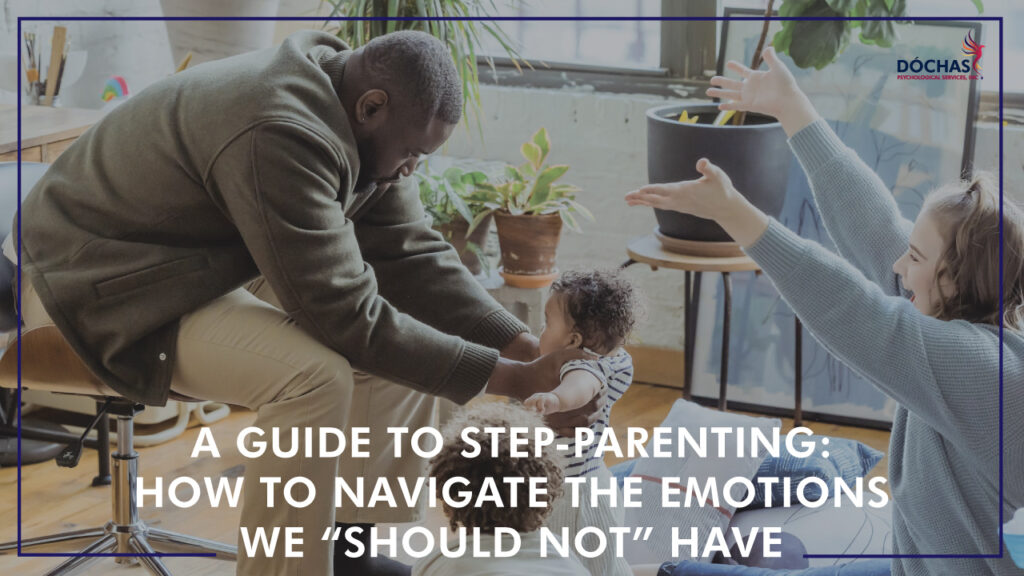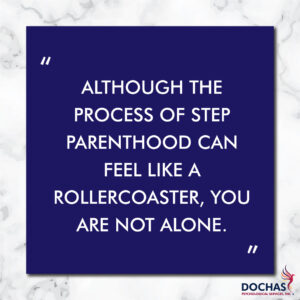It’s Kiersten here on the Dóchas blog today, and I’d like to offer to guide to step-parenting and all those emotions that can come with it.
So, you met someone. First off… congratulations. What a feeling, hey? The air is sweeter, the sun brighter… As time progresses you might start imagining your future and all the exciting things you’ll do together! And you know what? Who can blame you! When we are excited about something or someone, it is almost impossible not to envision what our future might hold.

Now, when you fall for someone who is a package deal, the honeymoon phase looks a little different. It might be the same in the sense that you imagine what your life together will look like; however, it gets a little (or a lot) more complicated when you are faced with recognizing that your life with this person does not just involve the two of you. There is an undeniable difference between this and a ‘normal’ courtship, and there are many emotions that go on behind the scenes. Although lots of those emotions are very positive, there are many others that we tend to cover up. These are the ones we are going to talk about in this blog. The ones we are afraid to feel.
My Story
I am a step-mom to four wonderful littles. That’s right… I said four (lol). My introduction to step-motherhood was carefully orchestrated by my partner and me to ensure that we were introduced to each other in a way that promoted a solid foundation.
I remember the day I met the kids like it was yesterday. We were supposed to go to a corn maze, which was my valiant attempt at incorporating bonding with adventure. Unfortunately, because we were in the height of COVID, we had to pre-book time slots—something I missed in the fine print on the website (I blame the nerves!). When we arrived, we were told it was full and to try again another day. Somehow, my now-fiancé, who is a gem, sold it to the kids that going to the park and kids’ restaurant thereafter would be much more fun. Luckily, I had another twenty minutes to drive and try and calm my nerves. I met them at the park and my partner ushered his children together to meet me. I could not believe it was happening.
For many of us, we spend hours imagining who these bright young people are for a long time before we come face to face with them. We learn bits and pieces about who they are through stories told to us by their mom or dad we now love. It can be exciting, but it is also daunting, and when we finally get to put the faces to the names, it becomes very real, very fast.
The Good, the Bad, and the Ugly
We are going to name those feelings today that we all have, but can’t say out loud. It is important to know that understanding yourself, your thoughts, and your emotions, even if they are ugly, does not make you a bad person. It makes you a strong person and liberates you from the turmoil you are feeling inside. Being a step-parent is no small thing, and neither are the emotions that go with it.
Uncertainty
When you are a step-parent, you never seem to feel one-hundred percent about anything. Am I doing too much or too little? Did I say that the wrong way? Do I discipline them? How do I know that if I get angry with them, I won’t scare them away? Do they really love me or are they just saying that? The list of questions can go on and on.
Being a step-parent can truly enhance many of the fabulous qualities you have as an individual. It can also shine a light on aspects of yourself you may not like. This adds not only the uncertainty of who you are as a step-parent, but also creates uncertainty in who you are as an individual. Insecurities may surface that you didn’t even know were there.
Love and Fear
Accepting love from children who you are attempting to build a foundation with is a scary and thrilling experience. The first time the kids told me they loved me I nearly burst into tears right there. It felt extremely validating to hear them echo what I had been feeling for them for months, but I was also very intimidated by this.
This love can be a scary thing to let in, and understandably so. You are now not only responsible for your partner’s heart but also their children’s. There is an innate sense of responsibility that comes along with that and it can be a lot to take in. Give yourself time to process this love and accept that it can take time to adjust to this new influx of emotion.
Grief
This can surface in several different ways. It can come with the realization that you won’t experience the big ‘firsts’ with your partner. They have likely been through it all already: engagement, marriage, welcoming their first child, and learning how to become a parent. Grief can surface with you recognizing that your relationship is far more complicated than what you originally thought it would be.
Grief comes from loss. When we lose something, we grieve its absence, and it’s a process to get through. When you are the second wife or husband, especially when you don’t have your own kids already, this emotion can be hard to avoid. We tend to dodge it because it’s uncomfortable to let in, so we lock it in a box, push it down, and hope it stays there. It is important to face this emotion and reflect on what exactly it is you are grieving. Please understand that this is a very normal feeling to have when engaging in a relationship with someone and being a second partner.
Jealousy
No matter how hard we both tried to make things ordinary, there were always hard conversations to have. From divorce proceedings to phone calls with the ex, to financial sacrifices, maneuvering schedules, and copious amounts of compromise. Hard decisions had to be made always. The truth is, it does not matter at what point you meet the kids—as soon as you enter that relationship, you walk into a step-parent role immediately. I say this because you are likely your partner’s sounding board, and this means that you are already helping make decisions from the get. This is what makes the dating experience far more complicated, and it is hard to find people that understand the toll this takes on a person.
This can cause us to become envious of other couples who get to experience a wonderfully ordinary courtship without worrying about diaper bags, pick-up and drop-off times, or which weeks or weekends are free to make plans. This is valid. Just remember to ask yourself if you do find yourself going down this rabbit hole, how is this emotion serving you?
Resentment
This emotion is completely real and I cannot stress enough how important this is to acknowledge. As hard as it is to accept, we must. Every parent, biological or not, experiences resentment. It goes without saying that there is a loss of identity we experience when we become parents. Your life is no longer just about you, or even just you and your partner—it now revolves around the children you’ve decided to have or welcome into your life.
Many people believe that just because you are a step-parent, you are not entitled to these feelings. WRONG. You are a parent, period, and you are entitled to all the feelings. It doesn’t mean you don’t love them, and it doesn’t mean you are a terrible person. It simply means you are human and are processing parenthood.
Recognizing resentment can look different to everyone, and it can manifest in many different ways. Are you beginning to dread the kids coming over? Are you purposefully ‘busy’ when they are around? Are you fighting with your partner over the lack of time you have together, or simply wondering if you have made a mistake choosing this life? These are all signs that you may have underlying resentment you haven’t yet dealt with. The thing about resentment is that the more you shove it down, the worse it gets. Don’t shut it out, listen to it. It has something to tell you.
Guilt
Coming face to face with the above emotions can be a gut-wrenching process, and it is oftentimes accompanied by huge amounts of guilt. We may face several existential questions like ‘What does this say about me as a person?’ ‘How can I possibly be a good stepparent if I feel this way?’ and ‘What does this mean for my relationship?’
The thoughts that follow are often hyper-critical and untrue. No, you are not a bad person, and you are still a valuable parent to those kids. All it means is that you have a lot of information your body and brain are trying to tell you, and it’s time to listen.
It is difficult to reframe our thinking and see the positives when we feel guilty. This is due to the fact that guilt drags us down, erasing many of the positive thoughts we have about ourselves. I encourage you to fight against that and look at the evidence that supports you being a great person and step-parent. Please also remember to give yourself a break, and remember that you are in fact human. You are allowed to feel these things.
You are Not Alone
Please know that although the process of step parenthood is a rollercoaster, you are not alone. As isolating as it can feel to be experiencing something that none of your friends or family have, there are resources out there to help you.
Talking about this with someone is a very important part of working through these feelings. Whether that is a close friend, another stepparent, your partner, a support group, or a therapist, the opposite of depression is ‘expression’ (thank you Edith Eger), and in order to alleviate those heavy feelings, you cannot keep them bottled up inside you.
I hope this guide helps you better navigate the emotions of step-parenting. As I mentioned earlier, choosing to be a step-parent is no small feat, and you should be celebrated for your courage to parent a child not born from you. If you find, however, that these emotions are too heavy to hold on your own, it can be helpful to reach out to someone to guide you through this experience. Reach out to us here at Dóchas—we can help. You can email us at info@dochaspsych.com, or call our main office at (780) 446 0300.
About Dóchas Psychological
Dóchas Psychological Services is a well-established and trusted therapy clinic located in Spruce Grove, Alberta. At Dóchas we value the idea that everyone deserves a safe space. Through connection and education, our team works hard to build a trustworthy relationship with each of our clients. It is our goal to create a community for our clients to feel like they belong.
Disclaimer
Information provided through Dóchas Psychological Services blogs or vlogs is meant for educational purposes only. They are NOT medical or mental health advice. You can read more about our disclaimer here.


